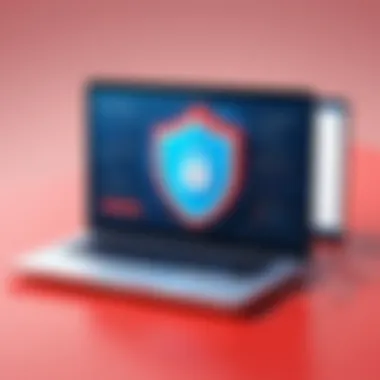Understanding the Risks of ExpressVPN Free Trial Hacks


Intro
The digital landscape is fraught with challenges for individuals navigating online security. As privacy concerns rise, many seek ways to safeguard their information. One area receiving attention is the unauthorized use of ExpressVPN free trials. Such actions, often labeled as 'hacks,' merit careful examination. It is essential to understand the implications of these practices and their effects on broader cybersecurity.
Through this article, we aim to uncover the methodologies and ethics surrounding this topic. We will also explore the consequences of these acts for users and the community at large. It is pertinent for readers to grasp both the risks involved and the implications for online safety.
Overview of Cyber Security Threats
In discussing ExpressVPN free trial hacks, it is beneficial to first consider the larger cyber threat landscape. The cybersecurity environment encompasses various attack types, impacting both users and companies.
Types of Cyber Threats
- Malware: Software designed to cause damage to a device, often introduced through deceptive links or attachments.
- Phishing: Scams aimed at acquiring sensitive information by pretending to be reputable platforms.
- Ransomware: A type of malware that encrypts a user's data, demanding payment for restoration.
Statistics on Cyber Attacks
Recent statistics reveal staggering numbers. According to reports, over 30% of internet users have encountered phishing attempts. Additionally, malware attacks are reported every minute. Such data is a stark reminder of the urgency in strengthening online defenses.
Real-life Examples of Security Breaches
Several high-profile incidents illustrate these threats clearly. For instance, the 2017 Equifax data breach exposed personal information of 147 million people. Similar breaches show that even well-established organizations are not impervious, highlighting the importance of constant vigilance.
Best Practices for Online Security
Fostering robust online security necessitates adopting best practices.
Strong Password Creation and Management Techniques
Creating unique passwords for different accounts is crucial. Ideally, each password should contain a mix of upper and lower case letters, numbers, and symbols. Tools like LastPass or 1Password can aid in managing and generating secure passwords.
Regular Software Updates and Patches
Failure to update software leaves users vulnerable. Regular updates ensure that system flaws are addressed promptly, reinforcing security.
Two-factor Authentication Implementation
Utilizing two-factor authentication adds an extra layer of protection. This method typically requires a secondary confirmation, reducing the likelihood of unauthorized access to accounts.
Reviews of Security Tools
Using the right security tools deepens online safety. Various options can bolster user defenses.
Evaluation of Antivirus Software Effectiveness
Antivirus solutions like Norton or Kaspersky can identify and neutralize threats effectively. Regular reviews of these platforms can help individuals choose the best fit for their requirements.
Comparison of Firewall Protection
Firewalls function as barriers between a user’s computer and potential threats from the internet. Options may vary in functionality and features; assessing them helps users understand how best to secure their systems.
Assessment of Password Managers
Password managers simplify the task of maintaining secure access across multiple services. Features may include automatic password changes, ensuring strength and reliability.
Tips for Ensuring Online Privacy
Ensuring online privacy intersects closely with security practices.
Importance of Using VPNs for Secure Browsing
Employing Virtual Private Networks (VPNs), such as ExpressVPN, establishes secure connections, shielding user data from external scrutiny. VPNs encrypt data, making it difficile for malicious actors to intercept sensitive information.
Privacy Settings on Social Media Platforms


Most social platforms have privacy settings that can mitigate data sharing. Adjusting these settings restricts how personal information is utilized by external parties.
Protecting Personal Data When Making Online Transactions
Being cautious during transactions is paramount. Ensure website URLs are secure before entry of sensitive details. Websites should display the padlock icon in the address bar to indicate a secure connection.
Educational Resources and Guides
A wealth of resources exists for individuals wanting to enhance their online security.
How-to Articles on Setting Up Encryption Tools
Numerous how-to guides illustrate encryption setups. Resources such as Wikipedia provide foundational knowledge on this topic.
Step-By-Step Guides on Spotting Phishing Emails
Identifying phishing attempts can be daunting. Websites possess informative content detailing telltale signs to help users recognize threats.
Cheat Sheets for Quickly Enhancing Online Security Practices
Printable checklists simplify the process of improving security habits. They offer users clear guidelines to follow consistently.
Safeguarding personal information online is a shared responsibility. Diligent attention to security practices aids in protecting oneself from prevalent cyber threats, solidifying the need for ethical approaches when considering options such as ExpressVPN free trial hacks.
Understanding VPN and Its Importance
Understanding Virtual Private Networks (VPNs) is essential in today’s digital age. As we navigate a landscape teeming with cyber threats, myriads of online services, and increasing demands for privacy, comprehending the role of VPNs becomes a foundational aspect of maintaining one's online security. ExpressVPN has gained prominence due to its blend of user-friendly functionality and potent security protocols, making it a focal point for discussions surrounding free trials and defenses against potential hacks.
What is a VPN?
A Virtual Private Network creates a secure connection between your device and a remote server. Through encryption and masking of IP addresses, it offers anonymity for users when browsing online. This means sensitive information might be safeguarded from prying eyes. Just by connecting to a VPN, a user can reroute traffic through a secure server, which acts as a shield against ISPs and other monitoring parties. With multiple protocols like OpenVPN and L2TP over IPSec available, VPNs can cater to varying levels of security requirements.
The Role of VPNs in Online Security
VPNs fulfill a critical purpose in enhancing online security. They protect data transmitted over the internet, especially on public Wi-Fi networks where risks are markedly higher. As businesses and individuals alike become more aware of potential breaches, relying on reputable VPNs like ExpressVPN is a strategic move. Some of the protective measures they provide include:
- Data Encryption: VPNs implement strong encryption protocols, ensuring data remains unreadable to unauthorized access.
- Anonymity: By hiding users' real IP addresses, a VPN helps maintain privacy when accessing various web services.
- Geolocation Change: Users can appear to be from different countries, which can open access to content restricted in their regions.
Effective usage of a VPN can significantly reduce exposure to hacking and tracking, factors imperative when leveraging online services.
Why Users Seek Free Trials
The growing trend among users to seek free trials of VPN services, such as ExpressVPN, can often be traced back to several motivations. Key reasons include:
- Risk-Free Exploration: Free trials offer users a chance to explore the VPN capabilities without immediate financial commitment.
- Evaluation of Performance: Users can test speeds, accessibility, and overall usability, which is critical for making an informed decision before subscribing.
- Awareness of Features: Free trials allow potential subscribers to assess features that meet their needs, from streaming to improved security.
While free trials provide value, misuse through hacks can have dire implications for both users and service providers. Understanding these dynamics is crucial for those navigating the VPN landscape.
Overview of ExpressVPN
ExpressVPN is widely recognized for its robust service in the realm of online security and privacy. In a digital landscape increasingly fraught with threats, understanding the features and offerings of this VPN service becomes crucial for users, especially amid the lure and convenience of free trials.
With advancements in technology, risks related to online privacy also grow, heightening the significance of tools like ExpressVPN. Their solutions cater to individuals who prioritize secure browsing and protection against unauthorized data access. Knowing this rationalizes why users look for trial opportunities. The impression of experiencing premium features can drive interest among discerning clients on constant lookout for effective security solutions.
This section thoroughly breaks down the critical elements surrounding ExpressVPN by providing insights into its distinctive traits, pricing structures, and trial conditions. Knowledge about these components helps readers make informed decisions while opting for VPN services, ultimately optimizing their digital security.
Features and Benefits
ExpressVPN stands out due to its impressive features. Users need security and speed, and this service balances both.
- High-Speed Connections: Often, users prefer uninterrupted access to online resources. This is where ExpressVPN shines by offering high-speed servers that reduce lag during streaming and browsing.
- User-Friendly Interface: Its application design caters to a broad audience, simplifying the connection process for both tech-savvy individuals and beginners.
- Strong Encryption: Security thus centers on ExpressVPN's AES-256 encryption. This standard protects online traffic against potential threats, bolstering confidence in maintaining privacy.
- Broad Server Network: Operating across numerous countries, ExpressVPN guarantees users access to diverse content while preserving anonymity online. Users can connect easily, helping to circumvent regional restrictions.
- Kill Switch Feature: If the connection drops, this feature halts internet traffic, avoiding unintended data exposure. Excellent for safeguarding sensitive activities.
These features, together with consistent updates and strong customer support, make it an appealing option for those seeking to enhance their online security.
Subscription Plans


When considering a service like ExpressVPN, reviewing its subscription plans is fundamental. The pricing structure reflects a balance between commitment and affordability.
- Monthly Subscription: At a higher rate, it offers flexibility. Ideal for users looking to test the service for a limited time.
- 6-Month Plan: This option serves as a middle ground, suited for users who feel they require ongoing protection without a long-term commitment at higher costs.
- 1-Year Plan: Users generally receive a significant savings percentage when purchasing an annual subscription, making it the most economical choice for long-term users.
All plans include access to all features and unwavering customer support, catering to both short-term tourists or professionals dedicated to consistent online privacy.
Trial Options and Terms of Use
Examining the trial options is crucial for users who want to test the service prior to commitment. ExpressVPN does not follow the typical route, as its free trial is restricted.
For those considering a subscription, ExpressVPN provides a 30-day money-back guarantee. This allows users to experience the full service without firm commitments. If unsatisfied, users can request cancellation and refund during this period.
Some key conditions to note include:
- The trial is specifically for users new to ExpressVPN.
- User support remains available throughout the trial period, ensuring questions can be answered about usage.
This model allows potential subscribers to evaluate fully before deciding, signifying a customer's importance in the decision-making process and nurturing trust between service and user.
Always read the policy documentation to fully understand usage terms, as this can impact overall satisfaction with a service.
The Appeal of Hacking Free Trials
Free trial hacks, particularly concerning ExpressVPN, draw a diverse audience because of various factors. A widespread accessibility to these hacked trials raises noteworthy red flags in terms of security and ethics. This particular segment addresses why some users opt for these hacks and examines their varying motivations.
Common Techniques Used in Hacks
Several techniques are frequently employed by individuals looking to hack free trials. Understanding these methods highlights the precarious nature of online security.
- Account Sharing: Users may share accounts with friends or family to circumvent individual subscription requirements. This leads to an inflated use of the service beyond its intended design.
- Temporary Email Services: Many potential hackers may utilize temporary email services to create multiple accounts and consistently extend their access to free trials.
- VPN Manipulation: Some users employ VPNs to obscure their original location. This technique, unfortunately, paves the way for accessing regional free trials that require geo-restrictions.
- Automation Scripts: Basic programming knowledge allows individuals to use scripts that automatically create accounts databases based on publisher responses and automated verification attributes.
These methods, although technically efficient, expose significant vulnerabilities for users and violate Terms of Service agreements.
User Motivations for Seeking Hacks
Understanding why individuals pursue hacking free trials helps contextualize the importance of this practice. Various motives drive this behavior:
- Cost Minimization: Many consider a paid subscription unnecessary, especially when a cheaper or even free alternative may be perceived as sufficing. Users consequently turn to hacks.
- Skepticism About Paid Services: Some may question the value of online protection and feel securing free access confers a way to test these services without commitment.
- Curiosity and Experimentation: There's an inherent curiosity, especially among tech-savvy users. Many want to experiment with premium features, thus engaging in hacks to prolong their experience.
- Peer Influence: When people observe others boldly accessing premium services, they feel incentivized to explore similar measures to maintain parity within their social and online circles.
Understanding these motivations not only emphasizes the appeal of hacking free trials but also raises questions about the broader implications concerning cybersecurity integrity.
Users must assess whether such actions contribute to a sustainable ecosystem for online privacy and whether a compromised ethical stance compromises ultimate security solutions.
Risks Associated with Free Trial Hacks
Understanding the risks involved in hacking free trials is essential for navigating the online security landscape responsibly. The implications of such actions stretch beyond minor unlawful activities, potentially exposing individuals to severe legal, security, and reputational risks. This discussion aligns with the broader quest for privacy and safety in digital interactions. By comprehending these risks, users can better protect themselves and their information from harmful actions associated with hacks of services like ExpressVPN.
Legal Consequences
Hacking trials or exploiting vulnerabilities in services like ExpressVPN is a breach of terms and conditions set by service providers. Engaging in such practices can lead to various legal consequences, including:
- Civil Liability: Companies can pursue legal action against individuals who misuse their products. This may result in penalties, fines, and even legal fees.
- Criminal Penalties: In many jurisdictions, hacking can be a criminal offense. Convictions could result in imprisonment or hefty fines, depending on the severity of the hack and local laws.
- Lawsuits: Users who hack may find themselves facing lawsuits from both the service providers and potentially from other affected users.
Remember that engaging in these activities can lead to consequences far exceeding what may initially be perceived.
Potential Security Vulnerabilities
Apart from legal repercussions, hacking free trials can severely impact personal security. Here are several ways this happens:
- Exposure to Malware: Complex hacks may require downloading software. Such software can often contain malware, which compromises system security and can lead to identity theft.
- Compromised Accounts: Users may input sensitive information when trying to hack trial periods. This data can be intercepted by malicious actors, leading to unauthorized access to online accounts.
- Privacy Violations: By utilizing unregulated methods to access trials, users often sacrifice data privacy for suspicious means. Their activities online might become traceable, threatening personal privacy.
These vulnerabilities are serious concerns for those prioritizing online security.
Impact on Reputation and Trust


The long-term ramifications of hacking free trials extend into one’s social and professional reputation as well:
- Erosion of Trust: If a user is exposed as a hacker, friends, colleagues, or potential employers may regard them with suspicion. This mistrust can develop long-lasting impacts on personal and professional relationships.
- Professional Risks: Many cybersecurity companies conduct background checks. Engaging in illegal activities can lead to losing career opportunities and advancements in the field.
- Community Backlash: Users may face criticism from peers or within online communities. In some groups, ethical behavior is a fundamental collective value. Finding oneself at odds with these values leads to social disruption.
Ethical Considerations of Hacking
Ethical considerations surrounding hacking practices are critical in understanding the broader impacts of actions pertaining to free trials of ExpressVPN. The conversation shifts from whether hacking is technically feasible to how these methods imbue various moral dimensions. Acknowledging these considerations can benefit individuals and the tech community at large. The pursuit of online privacy and unrestricted access often blinds individuals to the ramifications of credible hacking practices. This subsection delves deeper into the consequences of hacking free trials on both users and the cybersecurity field.
Consequences for the Cybersecurity Community
The act of hacking free trials, even for educational purposes, poses significant risks to the cybersecurity community. Highlights include:
- Erosion of Trust: Hacking fosters a culture of mistrust among users and service providers. Sustained exploitation of free trials casts doubt on legitimate users eager for exhaustive experiences, leaving companies reluctant to trust their consumer base.
- Vulnerability Exploitation: Bad actors often disclose confidential vulnerabilities, possibly leading tech companies to spend valuable resources on incident response instead of proactive feature enhancement.
- Incentivizing Illegitimate Practices: When hacks succeed, they can incentivize additional insecure practices within the community. Emerging threats stem from successful hacks, leading to a vicious cycle.
- Inducing Regulatory Backlash: Detrimental effects may result in enforcement by regulatory bodies. Increased scrutiny often serves to over-regulate legitimate user requests, impacting service availability and user experience.
Contributing effects can significantly hinder the commitment to improving online security standards and innovation, thus stifling growth within the sector.
Moral Implications for Users
When considering the morality behind seeking hacks for free trials, several aspects stand out:
- Lack of Respect for Intellectual Property: Using methods to circumvent subscription models shows a disregard for the value offered by developers. Intellectual property rights ensure that creators can garner returns on their investments.
- Security Compromises: As individuals experiment with hacks, they expose themselves to increased security vulnerabilities. This could lead to unintentional consequences causing data breaches, identity theft, or system infiltration.
- Reinforcing Unlawful Behavior: Engaging in hacking reinforces negative behaviors that can spoil a culture toward compliance. Users who perpetuate this norm often disregard the larger context of acceptable digital conduct.
- Harm to Fellow Users: Those engaged in hacking practices can inadvertently affect legitimate users. The more machines infected during exploits or negative exploits taking place in networks compound consequences.
In sum, individual actions yield ripple effectd. Pursuing ethical practices reaffirms respect within the community while ensuring an environment fostering transparency and development.
"The path we choose to take as individuals impacts the collective environment of all online interactions."
In summary, both the cybersecurity environment and individuals must evaluate their ethical obligations regarding hacking free trials. By forging a commitment to integrity, everyone can help maintain a safe digital landscape.
Alternatives to Hacking Free Trials
In striving for online security and privacy, exploring alternatives to hacking free trials provides a sound approach. While the temptation to exploit free trials often stems from a desire to conserve resources, seeking legitimate options ultimately supports integrity within the cybersecurity community. This section discusses viable alternatives, emphasizing their importance and versatility.
Exploring Legitimate Free VPN Options
Various legitimate free VPN options exist for users who seek safe and budget-friendly methods to maintain their online privacy. Options like ProtonVPN and Windscribe offer usable free versions without the inherent risks associated with hacks. These reputable services prioritize user safety and do not encourage activities that compromise their integrity. Benefits of legitimate free VPNs include:
- Access to Reliable Services: Many maintain a good level of encryption and don’t track user activities.
- No Legal Risks: Unlike hacked trials, which may involve suspicious terms and conditions, legitimate free versions allow peace of mind without The threat of legal woes.
- Secure Environment: Reputable providers often invest in technology to protect their users, elevating their level of security even above unverified hacks.
Additionally, free editions may benefit from limited bandwidth or access to select servers. However, well-structured, legitimate free VPN options can sufficiently enhance online privacy while maintaining compliance.
Evaluating Trial Options from Other Services
Many Virtual Private Network services instead of ExpressVPN also offer robust trial options. Services like NordVPN or Surfshark deliver trial periods to afford potential users a taste of their offerings without obligations. Exploring these trials reveals much about their overall quality and capacity:
- Clear Terms and Conditions: Legitimate trials exist to let consumers evaluate services thoroughly. Understanding conditions helps avoid unpleasant surprises later.
- Comprehensive Features: Users can often access the same features as regular subscribers through the trial. This firsthand experience facilitates informed decisions.
- Genuine Customer Support: Evaluating different services provides an opportunity for users to interact with customer support teams to gauge responsiveness and professionalism.
Considering these trials as elevating choices helps one avoid the pitfalls associated with dubious hacks without sacrificing the ambition of effective online security. By evaluating well-known contenders in the market, users can choose compatible services to meet their privacy demands.
In summary, engaging with legitmate free VPN options and evaluating service trials reinforces smarter and safer online practices than resorting to hacks.
Epilogues and Recommendations
Exploring the topic of ExpressVPN free trial hacks leads to critical insights regarding practices that can endanger online security. This article provides a delineation of associated risks, ethical considerations, and practical alternatives to recommend a secure and responsible approach to online privacy. Adopting safer practices ensures users can enjoy the benefits of VPN services without sacrificing their integrity or security.
Encouraging Safe Practices
Safe practices should remain a top priority for all internet users. Users can understand and apply basic principles to protect themselves online. Consider the following strategies:
- Use Legitimate Services: Always choose respected and well-reviewed VPN services. ExpressVPN, for example, has earned a solid reputation in terms of trust and security.
- Read Terms of Service: Acquaint yourself with the terms and conditions of any service, especially free trials. Understanding what you agree to is critical.
- Regularly Update Software: Ensure that your applications are up-to-date. Vendors often resolve vulnerabilities in new versions.
- Educate Yourself: Knowledge on online safety should not be taken lightly. Attend workshops or webinars when possible.
Following these practices can significantly mitigate risks of hacking and potential misuse of services. The goal is to find the balance between using technology and maintaining personal security.
Maintaining Integrity in Cybersecurity
One's integrity within the cybersecurity community shapes broader norms and behaviors. Vulnerabilities can propagate with acts like hacking free trials; these reflect on users and services alike. Affecting the reputation of otherwise commendable platforms has far-reaching implications. Thus, maintaining integrity is crucial:
- Promote Ethical Use: Encouraging friends and colleagues to engage with services ethically fosters a responsible community.
- Report Malicious Activity: If you encounter any hacks or breaches, report them to the service provider to help prevent further issues.
- Advocate for Transparency: Support initiatives aimed at transparency among service providers in terms of data usage and privacy policies.
By collectively holding the community accountable, users contribute to a healthier online landscape. It reinforces trust and confidence in technological advancements essential for daily operations. In doing so, the cybersecurity fabric remains robust and protective for all individuals.
By following the principles of security and integrity, individuals can navigate the complexities of online services confidently.







